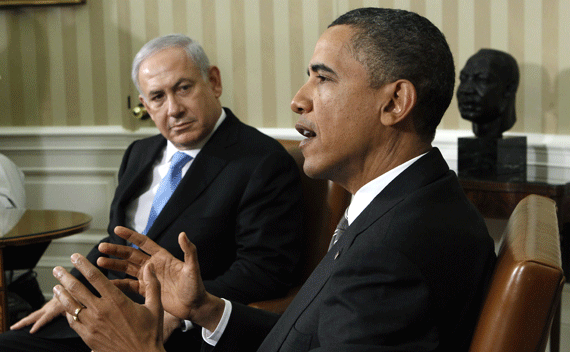Quick Takes: Obama Favors Congressional Action on Libya
More on:

Last week’s Friday File noted that Congress has not acted either to bless U.S. military operations in Libya or to end them. President Obama wrote congressional leaders late Friday to say that he supports a draft Senate resolution on that score. John Kerry, John McCain and five other senators formally introduced the resolution this afternoon. The operative language in the bill says that the Senate “supports the limited use of military force by the United States in Libya as part of the NATO mission to enforce United Nations Security Council Resolution 1973.” Note the verb—“supports.” That suggests Congress is a commentator on this exercise of the war power rather than the body whose approval is required. That’s not quite what the Framers had in mind.
In other news:
- President Obama laid down some markers for Middle Eastern leaders in his speech last week. The early reactions suggest they aren’t listening. The headlines in the newspapers that ended up on my doorstop tell the story: “Israeli leader rebuffs Obama on ’67 borders.” “At least 32 killed by Syrian troops: Assad defies Obama’s rebuke.” “Yemen’s Saleh refuses deal to bow out.” (The web versions of these articles went for slightly softer headlines.) Which raises a question: When does it make sense to draw lines in the sand that you may not be able to enforce?
- Herman Cain and Tim Pawlenty both have become full-fledged GOP presidential candidates. Cain made his announcement Saturday in a rally in his hometown of Atlanta. He also sat down for an interview with Chris Wallace of Fox News Sunday. The first two-thirds of the interview is devoted to domestic policy, but the final third explores Cain’s foreign policy views. He says that President Obama “threw Israel under the bus” last week and that a President Cain would offer the Palestinians “nothing” to make peace. He also stands by his position that he cannot decide his Afghanistan policy until he becomes president and can see intelligence reports. Pawlenty made his announcement in Des Moines today, but he gave away the punch line yesterday by releasing a video announcing his candidacy. Like Cain, Pawlenty has sharply criticized Obama’s proposal for the Israeli-Palestinian peace process, saying that it is a "disaster waiting to happen."
- Jon Huntsman, the former Utah Governor and until last month the U.S. ambassador to China, continues to explore his presidential chances. In a swing through New Hampshire last week, he addressed foreign policy issues. Like Cain, Pawlenty (and seemingly every other GOP presidential candidate or potential candidate) criticized Obama’s Middle East speech. He also struck an optimistic note about America’s ability to compete with China: “You hear how the Chinese economy is going to swamp us. Don’t believe it.” But Huntsman departed from his potential rivals on other topics. He said he would not have intervened in Libya, in good part because of its cost but also because stopping massacres might mean “we could be responding to corners of the world constantly.” He also said that the United States has “a generational opportunity to reset our position in the world based on affordability.” If initial criticisms don’t lead Huntsman into a full-scale retreat from these stances, the GOP foreign policy debate could become interesting.
- Indiana Governor Mitch Daniels won’t be joining the race for the Republican presidential nomination. His decision to stay on the sidelines doesn’t have any obvious consequences for the GOP foreign policy debate. Daniels has said little in recent months about his foreign policy views—even when directly asked. For instance, when asked about political upheaval in Egypt, he replied: “I don’t have a lot to say about it. I’m just a provincial governor out there.” Now that Daniels won’t be a contender, Indiana’s streak of never producing a president will continue for at least another four years. Perhaps the Hoosier State should ask its eastern neighbor for advice. Ohio holds the record for producing the most presidents; seven of them were born there. That is why Ohio fashions itself the mother of presidents. Indiana did give us a Republican presidential nominee, Wendell Wilkie. However, he lost badly to FDR in 1940.
More on:
 Online Store
Online Store
